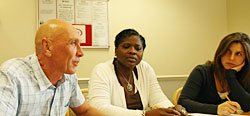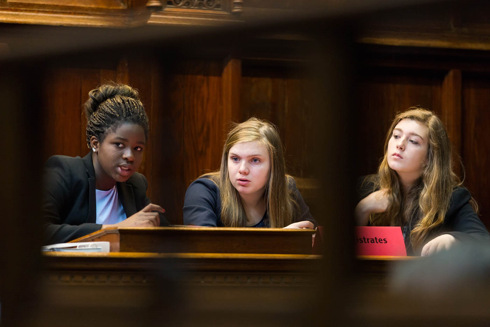Diversity and Community Relations Judges
In this post we examine the role of DCR or Diversity and Community Relations judges, who reach out to minority and disaffected groups as well as to the wider public to give them a better understanding of the legal process and what happens in court. Giving the opening address at the Transparency Project’s Child Protection
In this post we examine the role of DCR or Diversity and Community Relations judges, who reach out to minority and disaffected groups as well as to the wider public to give them a better understanding of the legal process and what happens in court.
Giving the opening address at the Transparency Project’s Child Protection Conference 2016 in Birmingham this week, District Judge Gailey spoke about his voluntary role as a DCR or Diversity and Community Relations judge. He said the idea started in Leeds, where judges were concerned that members of minority groups were not engaging with the court process. The aim was to reach out and tell them more about it, to dispel the myths surrounding judges and to increase their confidence in the system.

There are now about 100 DCR judges across the country, who do it voluntarily in addition to their own (increasingly crowded) lists, and thus invariably in their own time. They are selected by a process that involves training seminars and a strategy is set each year.
Their primary role is to give those who may find themselves having to use the court process a more accurate picture of the role of the judge and the working of the justice system, to dispel the myths surrounding judges, and increase their confidence in the court system.
Secondly, they aim to encourage greater diversity among those applying to become judges, helping to promote the role among under-represented groups.
Third, their role is to assist other members of the judiciary in dealing with diversity issues in their judicial work.
Giving examples of activities in which he’s been involved over the last year, DJ Gailey said they included:
- Activities involving students and young people, such as scripting sentencing remarks in a school play which the pupils had put together.
- Religious and cultural activities, such as attending events organised by the Federation of Muslim Organisations and by local Sikh and Hindu groups.
- Events involving the general public, such as open days in court, mock trials, and You Be The Judge events. For the latter type of event, the judge will usually script a case and members of the public take part as jurors or even the judge and make the decision, before discussing it afterwards. It would all take place in a court room and thus seem quite realistic.

DJ Gailey sits as a judge mainly in Birmingham and Wolverhampton, dealing exclusively with Children Act and adoption cases, and another aspect of DJ Gailey’s work as a DCR judge is to visit a number of contact centres, to see what goes on there, and to understand the dedication and work done by the staff at such places. He also attends adoption events, and with his colleagues visits Cafcass offices and child social service departments, again to see at first hand the work that goes on there. Such visits provide an opportunity to exchange information and views and increase understanding in a way denied by the routine and busy court process. Family justice, he says, should be a process in which there is an exchange of views, not just one area criticising another.
The role of the DCR judge has expanded over time and is increasingly important, says DJ Gailey, particularly in private law cases where more of the parties are having to represent themselves as litigants in person (LiPs). For many such litigants it will be their first experience of the court process in what is often an extremely emotive situation. The role of the judge is changing in such hearings. It has to be an interactive process: you need to lead the parties to the order, not simply impose it. You have to sell the judgment to them, otherwise it is not going to work.
Clearly, in those circumstances, the more you can help people understand the court process and the role of the judge before they find themselves in that situation of being in court themselves, the better. This can only emphasise the importance of the voluntary work being undertaken by DJ Gailey and the many other judges who act as DCRs.
You can read more about DCR judges on the Judiciary website.
Find out more about getting involved as a lay person: Open Justice (part of Gov.UK).
Photo 1: Open Justice
Photo 2: Citizenship Foundation, Magistrates’ Court Mock Trial Competition